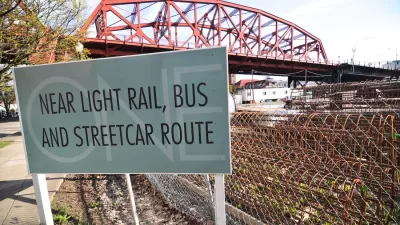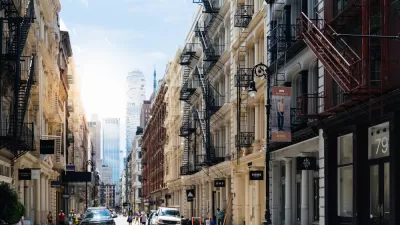A report released last week by Cushman & Wakefield has won a lot of attention from media outlets covering large-scale development market trends. Among the report's findings: growing cities need to better support transit-oriented development.

"Cushman & Wakefield has released a new report that explores the consequences of rapid population growth in 10 major North American cities," reports Rayna Katz for Globe St. The report, titled Urban Development: Faster Greener Commutes Key to Sustained City Growth, "discusses the impact of intensified gridlock and slow commutes that impact work productivity and quality of life, along with the transit-oriented real estate developments helping to relieve congestion and support growth." The report examines case studies from Atlanta, Boston, Chicago, Los Angeles, Mexico City, Miami, New York, San Francisco, Toronto, and Washington D.C.
A key finding of the report: "the majority of new commercial development, as well as residential development, in metro areas today is transit oriented."
Susan Pigg, writing for the Toronto Star, elaborates on the implications of that last point, pointing out the report's argument that "developers remain almost universally challenged by aging or insufficient infrastructure, red tape, lack of funding and NIMBYism among residents who may not want new transit lines in their backyards."
Writing for Finance-Commerce, Cali Owings points out another trend reported by Cuchman &Wakefield: " In most cities included in the report, developers report a price premium of 10-25 percent for construction of transit-oriented projects because of the location and infrastructure improvements needed. In many cities, public efforts boost TOD despite barriers."
FULL STORY: C&W: Transportation Drives CRE Development

Planetizen Federal Action Tracker
A weekly monitor of how Trump’s orders and actions are impacting planners and planning in America.

Restaurant Patios Were a Pandemic Win — Why Were They so Hard to Keep?
Social distancing requirements and changes in travel patterns prompted cities to pilot new uses for street and sidewalk space. Then it got complicated.

Map: Where Senate Republicans Want to Sell Your Public Lands
For public land advocates, the Senate Republicans’ proposal to sell millions of acres of public land in the West is “the biggest fight of their careers.”

Maui's Vacation Rental Debate Turns Ugly
Verbal attacks, misinformation campaigns and fistfights plague a high-stakes debate to convert thousands of vacation rentals into long-term housing.

San Francisco Suspends Traffic Calming Amidst Record Deaths
Citing “a challenging fiscal landscape,” the city will cease the program on the heels of 42 traffic deaths, including 24 pedestrians.

California Homeless Arrests, Citations Spike After Ruling
An investigation reveals that anti-homeless actions increased up to 500% after Grants Pass v. Johnson — even in cities claiming no policy change.
Urban Design for Planners 1: Software Tools
This six-course series explores essential urban design concepts using open source software and equips planners with the tools they need to participate fully in the urban design process.
Planning for Universal Design
Learn the tools for implementing Universal Design in planning regulations.
Heyer Gruel & Associates PA
JM Goldson LLC
Custer County Colorado
City of Camden Redevelopment Agency
City of Astoria
Transportation Research & Education Center (TREC) at Portland State University
Camden Redevelopment Agency
City of Claremont
Municipality of Princeton (NJ)



























